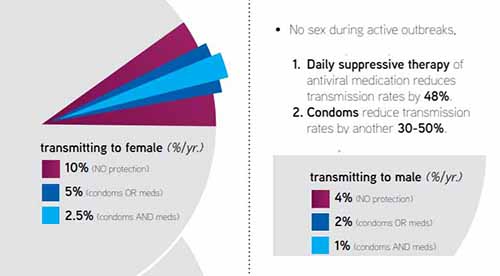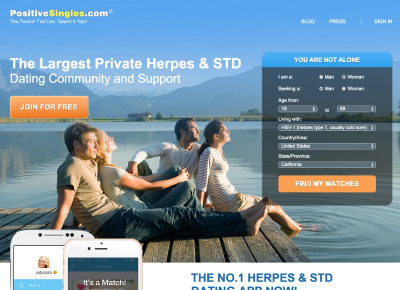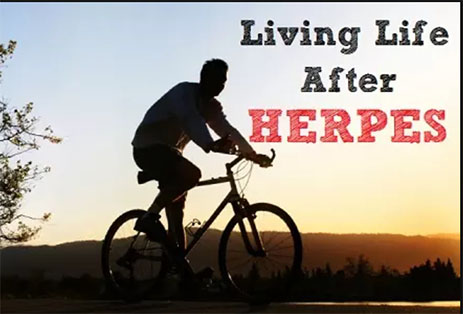Some new diagosed people may feel like their sex lives are ruined forever and that’s in no way the case. Some common questions many people have after their herpes diagnosis are:
- Is sex over for me?
- Can I ever have a normal sex life again?
- Will my sex same like before?
- Can I have sex without a condom?
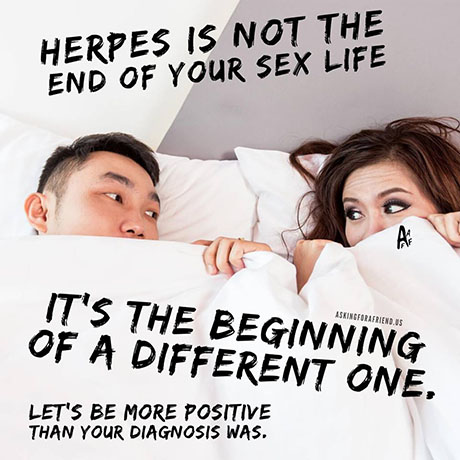
The reality about sex life with herpes is that it's entirely feasible to lead a satisfying sexual and social life, regardless of whether you have HSV-1 or HSV-2. You can have a perfectly fulfilling sex life with herpes, though it might be more complicated than before being diagnosed.
In this comprehensive guide, we will address all aspects of engaging in sexual activity when living with herpes, ranging from disclosing your HSV-1 or HSV-2 infection status to your partner, to utilizing antiviral medications, condoms, and other protective methods to minimize the risk of transmitting the virus.
What is your risk of transmitting herpes?
Education is what will really help you. Learn about having sex with herpes, including the precautions you can take and your chances of transmitting the virus. Once you’re educated and follow our tips, you’ll notice your sex life is just as awesome as it was before.
The likelihood of spreading herpes (Herpes Simplex Virus or HSV) to a sexual partner can vary depending on several factors, including whether or not there are visible sores (symptomatic) and whether it's HSV-1 or HSV-2. It's important to note that herpes can be transmitted even when there are no visible symptoms (asymptomatic shedding), but the risk is generally lower during asymptomatic periods compared to when sores are present.
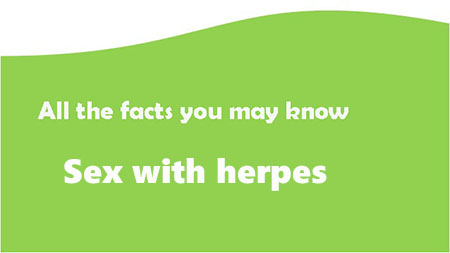
With Visible Sores (Symptomatic):
- During outbreaks (when visible sores or lesions are present), the risk of transmitting herpes to a sexual partner is relatively higher.
- The risk is higher for both HSV-1 and HSV-2 during symptomatic periods.
Without Visible Sores (Asymptomatic):
- Herpes can be transmitted even when there are no visible symptoms. This is known as asymptomatic shedding.
- The risk of transmission during asymptomatic shedding is generally lower than during symptomatic periods but still exists.
- HSV-2 is more likely to be associated with asymptomatic shedding than HSV-1.
Although you must always inform partners of your herpes status, you and your partners may want to know your transmission rates.
You are most likely to spread genital herpes during an outbreak, which is when a sore is present. Herpes is most contagious before, during, and after blisters appear. Check more information about how long after an outbreak is it safe to have sex.
When you are not in an outbreak, you transmission rate is about four to ten percent.
Studies done by Valtrex, a common antiviral medication, state that these are the transmission rates per year of regular sex:
When a partner avoids sex during an outbreak, females to males have 4% chance of transmission and males to females have 8% chance.
When partners use condoms or an antiviral medication, the chance is two percent female to male, and four percent male to female. When partners use condoms and antiviral medications, the risk is one percent female to male and two percent male to female.
It’s okay to delay intimacy for a while if you aren’t okay with the risk or relationship yet. Allow yourself time to know your partner better and adjust to the idea of getting herpes. You never need to rush into sex until you’re ready.
Always inform partners and allow them to accept the risk on their own terms
When you want to have sex with a new partner, it is your sole responsibility to disclose your herpes status prior to engaging in intercourse. You may let them accept the risk. There are extra precautions you can take to prevent your partner from contracting herpes. For example, you would want to avoid sex during an outbreak, take antiviral medication, and use condoms.
It's better to let your partner get tested, maybe your partner already has herpes, you’re both free to have a normal sex life like you would before being diagnosed. You cannot be reinfected.
It is very important for herpes patients to be completely open and honest with every sex partner. Your partner can contract herpes, regardless if sores are present. Ultimately, it is your partner’s decision on how much risk they’re willing to take. Hiding your diagnosis can break all trust.
Sometimes, people think they don’t need to disclose their diagnosis since they’re taking antiviral medication and using condoms, which lowers the transmission rate to around one percent. However, the risk is still there and it’s still important to be honest. Some people have other immune system diseases that will cause herpes to destroy their health. Keep your partner in mind and just be honest.
Not disclosing your diagnosis isn’t just inconsiderate, it’s illegal. If you have sex, don’t disclose your herpes status, and they find out, they can take legal action against you. You can be sued for damages, and have to pay for medical treatment for the rest of their life. It is public information so people will know your name and face.
How to tell someone you have herpes
It might feel scary to admit you have herpes, but talking about things can really ease your mind. You don’t have to greet every person you meet with “Hi, I have herpes.” As long as you are not sexully active yet, you can wait to disclose your diagnosis until you feel a strong connection between you two.

- Practice a bit with someone you trust: You could lean on a close, non-judgmental friend that you trust to keep the conversation private.
- Pick the right setting The right setting is a relaxing one, just the two of you, where there won't be any distractions. A conversation over a quiet dinner or a walk in the park is preferable to a bowling alley or the supermarket.
- Choose the right time There are many different opinions. The only thing that most people agree on is that you should always tell a potential partner that you have herpes BEFORE you have sex with them, and give them enough time to learn more about it so that they can make an informed decision.
If at any time, you believe sex will happen, it is imperative to respect your partner and disclose your diagnosis. Explain to them what the risks are.
Worry about transmitting herpes, how can i get over it?
When you’re worrying about transmitting herpes, you will have a hard time focusing on your feelings that surround lovemaking, and this will make achieving an orgasm difficult.
Keep in mind, you have many scenarios in your life where your actions could cause harm to others, you also put yourself at risk of harm by others everyday. If everyone lived life in fear of actions that could only potentially cause harm, nobody would ever go outside!
Any sexually active adult is putting themselves at risk. Since one in six Americans between 14-49 have HSV-2, odds are very high that your next partner is in the same boat. The main issue is to have productive conversations around these issues.You can’t protect them one-hundred percent, but you can try. As long as you do what you can to reduce harm, your partner can decide the risk they’re comfortable with.
Remember, over time, your fears about spreading herpes will ease up. As you get over your fears, you’ll come up with a realistic plan to prevent transmitting herpes. Not everyone is okay with the risk of getting herpes, but there are people who will. This is especially true if you have a relationship before attempting intimacy.
Worry about possible transmission? Find a partner with herpes!
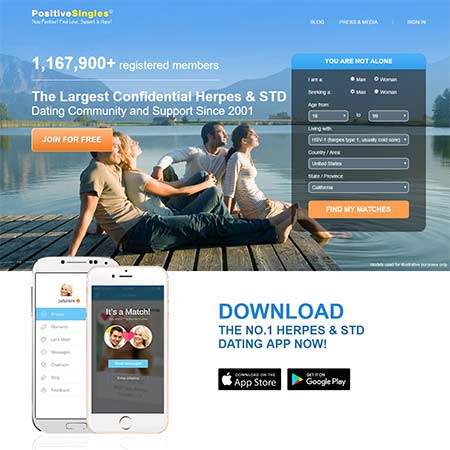
PositiveSingles is 2023 No.1 Herpes dating site and have been on the web for over 20 years. It has 1.7 million online people with herpes.
You can find thousands of nearby singles wiht herpes like you no matter you are looking for a casual relationship or long-term parters. Spend 3 minutes to place a profile and chat now.
How to Have Safer Sex if You Have Herpes
As long as you do what you can to stay safe, your risk of transmission is pretty low. The risk isn’t zero, but you can take steps to try and control the risk.
Take Steps To Prevent Transmission
1. Avoid sex during outbreaks.
During an outbreak, your risk of transmission is the highest. This includes from the first time your partner has warning signs, such as tingling or burning, until the last sore is healed.
Educate yourself on how to recognize an oncoming herpes outbreak. The length of your outbreak will depend on how long you’d had the virus and if you’re taking antiviral medications.
Not only is sex during an outbreak risky, the friction causes the outbreak to take longer to heal.
You can express yourself sexually without having genital-to-genital or mouth-to-genital contact.You could try mutual masturbation, which poses almost no risk: You could masturbate together -- side by side, facing each other, or back to back -- or masturbate each other manually.
2. Condoms Help - But They’re Not 100%
While condoms will lower the rate of transmission by about 30%, they don’t completely prevent transmission. Genital herpes only require skin-to-skin contact to spread, so areas condoms can’t cover are susceptible. There are people who have herpes even though they always use condoms.
Always use latex condoms and avoid ones with the spermicide nonoxynol-9. You want to avoid any oil-based lubricant as well.Read more about best condoms for people with herpes.
3. Using lots of lubricants
Lubricant won’t protect against any STDs, but they can reduce friction, which can reduce the risk of an outbreak. They can also help prevent condoms from breaking. Popular lubes, such as KY Jelly and AstroGlide are sold at most drug stores.
4. Use antiviral medication
Ask your doctor about antiviral medications. You can take it during an outbreak to speed up healing, or daily if you have frequent outbreaks.
Valtrex can be used to stop an outbreak while it is happening or be used daily to prevent outbreaks altogether. Daily use also reduces the time and likelihood the virus can shed.
5. Keep your immune system strong and healthy
Keep a healthy diet full of fruits and vegetables. Use natural supplements with antiviral properties or boost your immune system. Manage stress, as stress can weaken your immune system. Try different relaxation techniques, such as meditation, yoga, or positive visualization. Be sure to exercise regularly.
I have herpes, can I still give or receive oral sex?
Herpes can be spread by both the giver or receiver of oral sex. It can be spread by engaging in oral sex with someone with active cold sores in the mouth or genital sores.
Oral sex often transmits HSV-1 from one partner’s mouth to another partner’s genitals. Around fifty-percent of new cases of genital herpes are caused by HSV-1.
HSV-2, typically genital herpes, can spread to the oral region but it is not as likely. HSV-2 doesn’t strive as well in the oral environment. Only about 3% of oral herpes outbreaks come from HSV-2.
To prevent skin-to-skin contact, a dental dam can be used during oral sex. It is a latex barrier that is placed over the vulva.
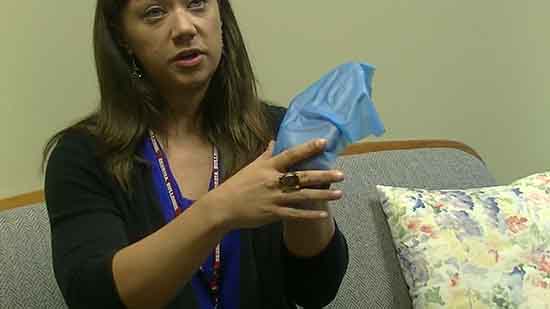
How to have a casual sex life with herpes
Sometimes when people get diagnosed with herpes, they aren’t ready for a serious relationship and just want a casual sex life. Herpes can make this difficult as you must disclose your status to your partners. You may face a higher rate of rejection than before. But We can assure you that there are people who won't really be concerned with the small risk. We heard lots of success stories.
Worry about possible transmission? Find a partner with herpes!

PositiveSingles is 2023 No.1 Herpes dating site and have been on the web for over 20 years. It has 1.7 million online people with herpes.
You can find thousands of nearby singles wiht herpes like you no matter you are looking for a casual relationship or long-term parters. Spend 3 minutes to place a profile and chat now.
Some people take daily medications and use condoms, so they think because this lowers transmission rates, they can skip “the talk.” This is wrong. The risk is small but it is still there. What if you were to transmit the virus? Is that something you’re okay with? How will your partner feel when they learn they have contracted the virus? Even if this doesn’t ring a bell in your moral compass, it is still illegal.
Many people still disclose their herpes status with casual sex partners, and many partners aren’t too worried about it. In the process of explaining the risk, you will also have the opportunity to show that you take every precaution to protect others.
If the idea of the herpes conversation makes you uncomfortable and you fear rejection, you could find partners on online herpes dating sites. For example, PositiveSingles have been on the web for over 18 years. It is easy to find another partner with herpes arould you. Sites like this make casual sex easier since there’s no risk of transmission and you can have a free sex life like before.
Will herpes affect my sex drive?
Herpes itself will not lower your sex drive. However, the other issues that come with herpes could. Sometimes patients will feel unattractive, feel stress and anxiety, and have a fear of infecting other partners. These feels need to be approached as they can lower your libido.
You should avoid sex during an outbreak, including during prodrome and until the final sore heals. Herpes affects each patient differently. Some people will have frequent outbreaks and others will not. Sexually active individuals may be bothered by the lack of sex during these times. These factors could lower the sex drive.
Have a fulfilling sex life when both partners have herpes

When both partners have herpes, it is possible to have a very fulfilling sex life. This is especially true if you have the same strain of herpes, since you don’t have to worry about accidentally infecting your partner. You both have the antibodies and cannot be reinfected. You won’t need to avoid sex during an outbreak (though it can delay healing) and you won’t need condoms or dental dams. It allows for a very free sex life.
Many people want a free sex life and use online herpes dating sites, such as PositiveSingles, to find partners with the same strain of herpes.
Worry about possible transmission? Find a partner with herpes!

PositiveSingles is 2023 No.1 Herpes dating site and have been on the web for over 20 years. It has 1.7 million online people with herpes.
You can find thousands of nearby singles wiht herpes like you no matter you are looking for a casual relationship or long-term parters. Spend 3 minutes to place a profile and chat now.
Conclusion: herpes won't ruin your sex life
With basic precautions, herpes has such a low transmission rate that you can still have a safe and fulfilling sex life. Remember, even when you’re asymptomatic, you need to inform your partners of your status. If you don’t feel comfortable having “the talk” yet, you can date other people with herpes for a short time.

